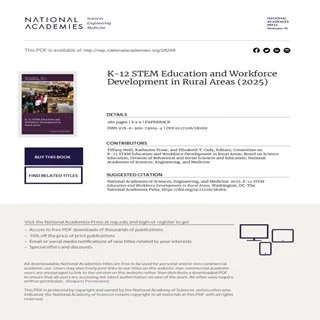By Christine M. Massey and Amy Stephens
In the modern history of the United States, investment in the teaching of science, technology, engineering and mathematics has resulted in a rich variety of education innovations (programs, practices, models, and technologies). Although a number of these innovations have had the potential to impact learners on a broad scale, that potential often remains unrealized. Efforts vary in their success in widescale implementation and sustainability across different educational contexts - leaving questions about how to achieve the major improvements to STEM education that many policy leaders seek.
Scaling and Sustaining Pre-K-12 STEM Education Innovations: Systemic Challenges, Systemic Responses examines the interconnected factors at local, regional, and national levels that foster or hinder the widespread implementation of promising, evidence-based Pre-K-12 STEM education innovations, to identify gaps in the research, and to provide guidance on how to address barriers to implementation. This report comes in response to a mandate within the CHIPS and Science Act of 2022.
National Academies of Sciences, Engineering, and Medicine. 2025. Scaling and Sustaining Pre-K-12 STEM Education Innovations: Systemic Challenges, Systemic Responses. Washington, DC: The National Academies Press












